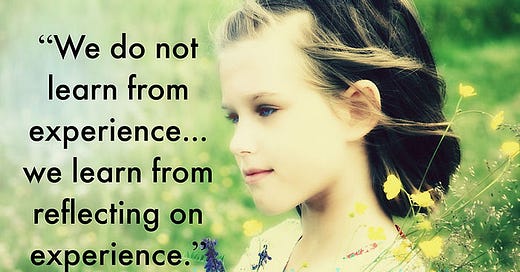I often see how teachers have an understanding of situations and a knowing of how to proceed that can be hard to define where, exactly, this wisdom comes from... its not directly from books or research, but from an intrinsic understanding of their profession.
for example:
"- it is tricky. and I have to say, a lot of it does just come from experience. In the example I gave above about the boy who did not respond to his name being called, I just "knew," from that very first day, that I was looking at "something". I didn't have any idea what at that point of course. and it very well could have been a child that was just recovering from a major ear infection with hearing loss and discomfort. But it was "something" and no checklist would have given me the answer. "
"I just "knew""
This "knowing" cannot be taught in the same way as facts - and yet it is a form of knowledge.
Luckily the ancient Greeks came up with a word for it "phronesis" - it means something like common sense, but that really is not a good enough explanation - it is more like practical wisdom - the ability to figure out what to do in any given moment while also knowing what is worth doing - we are wise about our intentions, wise about our ends, and at the same time we have a clear understanding of the means that we need to actually get there.
In the teaching world this means that the teacher is able to apply personal practical knowledge, taking into account the context of the present situation - and then will be re-applied to the teacher's knowledge-base to expand on. Its the knowledge gained by practical experience... practical experience that is reflected on.
Another example of phronesis is that just knowing what a child’s cry means - we know when it’s a sad cry, angry/frustrated cry, a hurt cry, or a hungry cry and some other cry in part because we know the child and in part because we know cries -and we know how to respond and actually respond. It’s the three steps - recognising, know how to respond and the action of response that all fit the situation.
If we are to build on our phronesis maybe then we need to be continuously reflecting - unpacking our experiences to learn from them...
some questions to help unpack our experience as teachers include...
can I identify my learning goals (ends)? (do we know why we are learning what we are learning?)
what are the intentions of my instructional choices? (do we know for what purpose we are doing this learning?)
what are the means (resources) available to support the teaching/learning - do I understand how they can be used?
am I able to make decisions about what is "worth doing" at my setting? (why this and not something else, and how does it connect to my context)?
Do I understand the intricacies of the children's lives? The context being an important part of how to proceed. (remember it can be important when working as a team that these questions are also asked together, as well as an individual, so that we can gain better understanding of our individual roles within the team)
am I spending time reflecting and connecting these questions and answers?
I am by no means any kind of expert in how the word phronesis is interpreted - this is how I apply phronesis to my work. To my understanding of what I do. As I feel that my past experiences have given me knowledge, and an understanding of how that knowledge can be used and received - and enable me to understand the present and make better choices about how I can support the children I work with. The difference between a teacher having experience and a teacher being phronetic is those three steps I already mentioned plus a fourth -
knowledge gained through experience and practice
knowledge of how to respond appropriately in the moment
action taken to respond
reflection and reflexion of the previous three steps
Reflexivity focuses close attention upon one’s own actions, thoughts, feelings, values, identity, and their effect upon children, colleagues and the play, as well as professional and social structures. The reflexive thinker has to stand back from
personal agendas, belief and value systems,
habitual ways of thinking about play and children,
normative ways of relating to others,
normative structures of understanding themselves and their relationship to the world, and
their assumptions about the way that the world impinges upon them.
I think it is extremely important that we are not only reflective of the experiences but also our own actions, values and intentions.
If this is something that has got you interested as an idea then why not read more in depth about it here and here
Learning does not just happen through books and academia - as this practical wisdom shows... knowledge is acquired through experiences (including play) and the connecting of these experiences with each other and knowledge gained in other circumstances (reading, listening etc). This implies that play has yet another benefit to add to it’s list of benefits - that of contributing towards a child’s phronetic wisdom.
I think that phronesis is an important word for early year educators and practitioners - as it indicates that we must take the time to reflect on our work - our actions, and interactions. To listen to the child, to the room, to the play, to reactions - and to connect this to our understanding of the world. A practical wisdom we can then apply to our work as both educators and parents.
I also think that phronesis connects to my idea of “Infraplay” the idea that play happens that sometimes goes unnoticed - unless we have phronetic knowledge of it, of course.
Infraplay
I listened recently to Krista Tippett interview Katy Payne on her “On Being” podcast entitled “In the presence of Elephants and Whales” (recorded in 2007). Katy Payne is an acoustic biologist.





